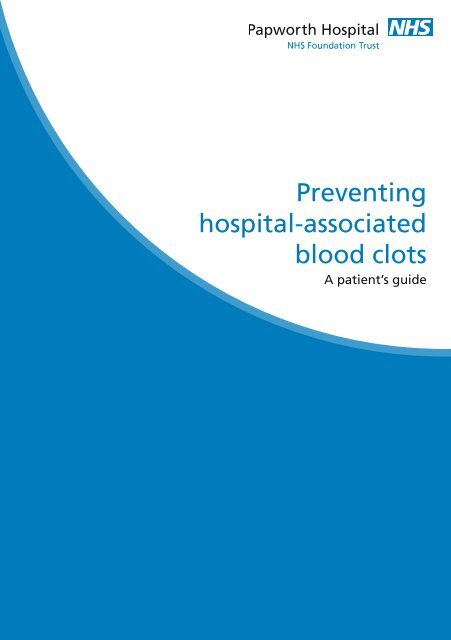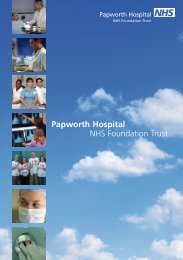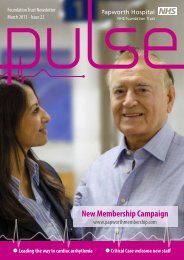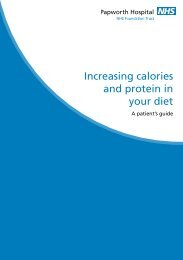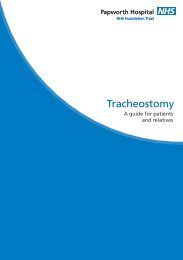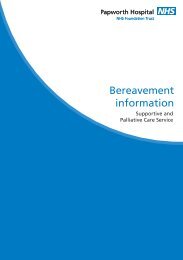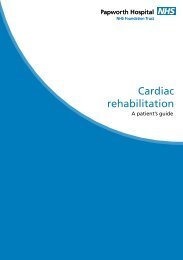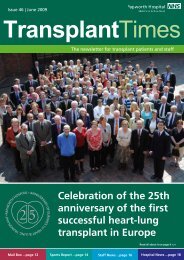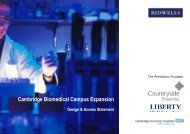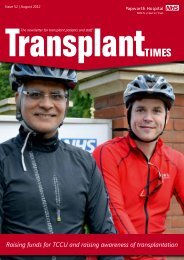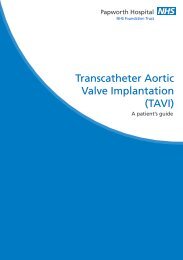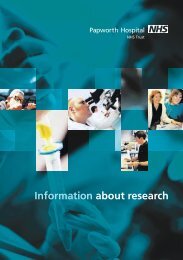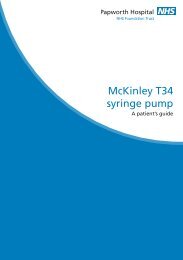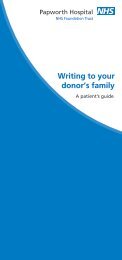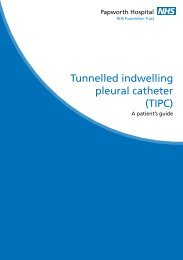Reducing the Risk of Blood Clots - Papworth Hospital
Reducing the Risk of Blood Clots - Papworth Hospital
Reducing the Risk of Blood Clots - Papworth Hospital
- No tags were found...
You also want an ePaper? Increase the reach of your titles
YUMPU automatically turns print PDFs into web optimized ePapers that Google loves.
A patient’s guidePreventinghospital-associatedblood clotsA patient’s guide1
A patient’s guideThis leaflet explains aboutblood clots, which can formafter illness or surgery.What are hospital-associatedblood clots?A hospital-associated bloodclot occurs in patients when<strong>the</strong>y are in hospital, and upto ninety days after a hospitaladmission. There are twokinds:1. Deep vein thrombosis (DVT)A DVT is a blood clot (alsoknown as a thrombosis)that forms in a deep vein,most commonly in your legor pelvis. It may cause nosymptoms at all or causeswelling, redness and pain.2. Pulmonary embolism (PE)If a clot becomes dislodgedand passes through yourblood vessels it can reachyour lungs, this is calleda PE. Symptoms includecoughing (with bloodstained phlegm), chest painand breathlessness. Healthpr<strong>of</strong>essionals use <strong>the</strong> termvenous thromboembolism(VTE), to cover both DVTand PE.If you develop any <strong>of</strong> <strong>the</strong>sesymptoms ei<strong>the</strong>r in hospital orafter your go home, please getmedical advice immediately.Are blood clots common?<strong>Blood</strong> clots occur in <strong>the</strong>general population in aboutone in 1000 people every year.You may have heard aboutDVT in people who havebeen on an aeroplane, butyou are much more likely toget a blood clot after goinginto hospital. In fact, abouttwo thirds <strong>of</strong> all blood clotsoccur during or after a stay inhospital.The Government recogniseshospital-associated blood clotsare an important problem andhas asked hospital doctors,nurses and pharmacists toassess each patient’s risk. Ifyou are at risk, your doctor ornurse will talk with you aboutwhat will be done to <strong>of</strong>fer youprotection against clots.1
A patient’s guideWhat can I do to help myself?If possible, before coming intohospital:• Talk to your doctor aboutcontraceptive or hormonereplacement <strong>the</strong>rapy.Your doctor may considerstopping <strong>the</strong>m in <strong>the</strong> weeksbefore an operation and willprovide advice on temporaryuse <strong>of</strong> o<strong>the</strong>r methods ifyour usual contraceptive isstopped.• Keep a healthy weight.• Do regular exercise.When in hospital• Keep moving or walking andget out <strong>of</strong> bed as soon as youcan after an operation - askyour nurse or physio<strong>the</strong>rapistfor more information.• Ask your doctor or nurse:“What is being done toreduce my risk <strong>of</strong> clots?”• Drink plenty <strong>of</strong> fluid to keephydrated, if your fluid intakeis not restricted as part <strong>of</strong>your treatment.What happens when I gohome?Until you return to your usuallevel <strong>of</strong> activity, you mayneed to wear anti-embolismstockings after you go home.Your nurse will tell you howto put <strong>the</strong>m on and what youshould check your skin for.If you need to continueanticoagulation injections athome, your nursing team willteach you how to do this. Ifyou have any concerns makesure you speak to a nursebefore you leave.If you develop any sign orsymptoms <strong>of</strong> a clot at home,<strong>the</strong>n seek medical adviceimmediately, ei<strong>the</strong>r fromyour General Practitioner(GP) or your nearest hospital’semergency department.3
A patient’s guideUseful sources <strong>of</strong> informationPlease ask your doctor or nurse for more information.NHS choices websitePatient information on blood clots.www.nhs.uk/thrombosisPatient Advice and Liaison Service (PALS)To make comments or raise concerns about <strong>the</strong> Trust’s services,please contact PALS. Visitors can contact PALS via a member <strong>of</strong>staff or by phoning 01480 364896, and patients can contact <strong>the</strong>service by pressing <strong>the</strong> PALS button on <strong>the</strong>ir beside phone.NHS DirectOffers health information and advice from specially trainednurses over <strong>the</strong> phone 24 hours a day.Tel 0845 4647www.nhsdirect.nhs.ukLifebloodThe Thrombosis Charity also has more information.www.thrombosis-charity.org.uk4
A patient’s guide<strong>Papworth</strong> <strong>Hospital</strong> NHS Foundation Trust<strong>Papworth</strong> Everard, Cambridge, CB23 3RETel: 01480 830541Fax: 01480 831315www.papworthhospital.nhs.ukA member <strong>of</strong> Cambridge University Health Partners<strong>Papworth</strong> <strong>Hospital</strong> is a smokefree siteFollow us onKeep in touch with <strong>Papworth</strong> <strong>Hospital</strong> and receive aquarterly newsletter. Join our membership free <strong>of</strong> charge atwww.papworthmembership.comTel: 01480 364240Author ID: Lead Nurse Practice DevelopmentDepartment: Practice Development/NursingReprinted: June 2014Review due: December 2014Version: 1Leaflet number: PI 8© <strong>Papworth</strong> <strong>Hospital</strong> NHS Foundation TrustLarge print copies andalternative languageversions <strong>of</strong> this leafletcan be made availableon request.


